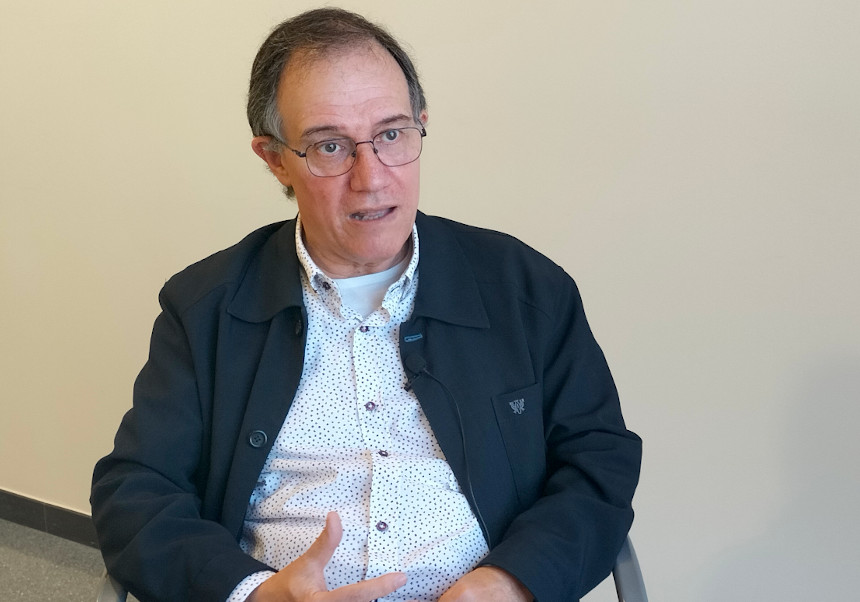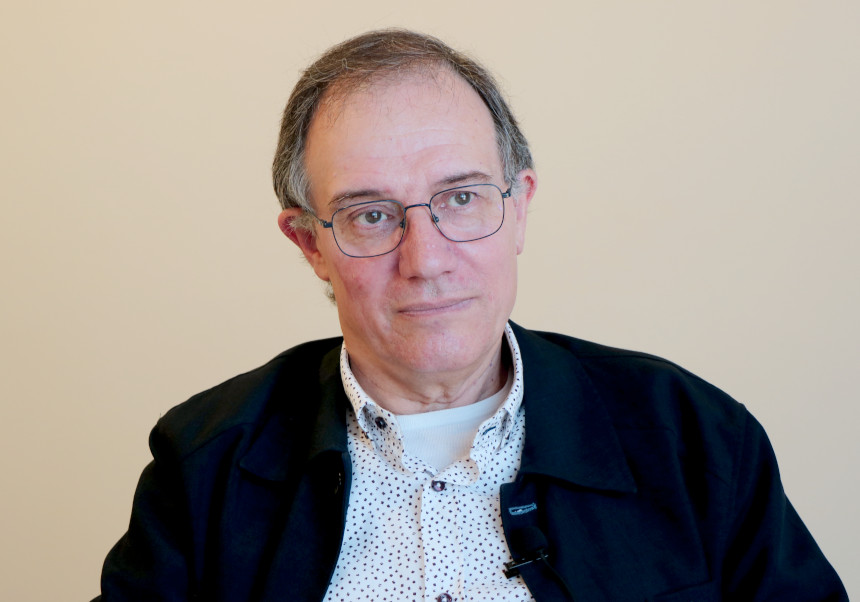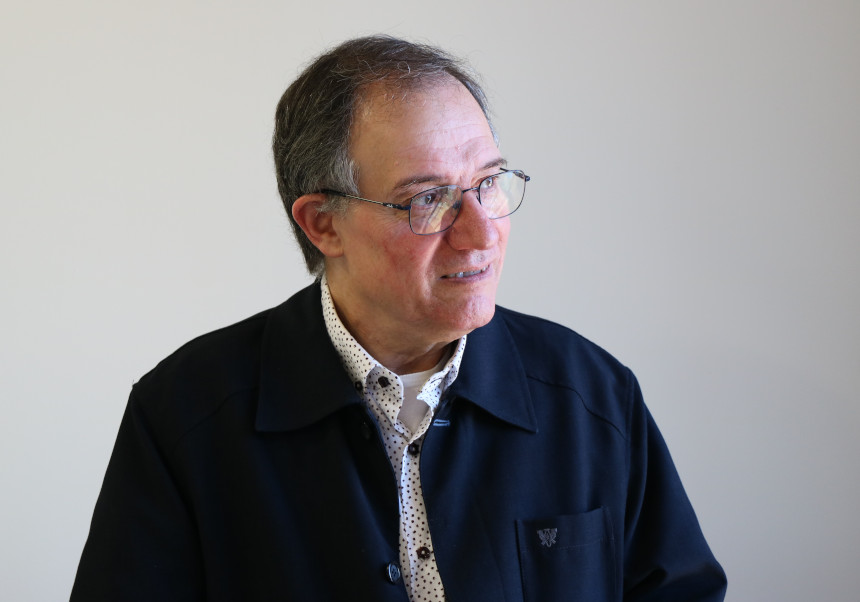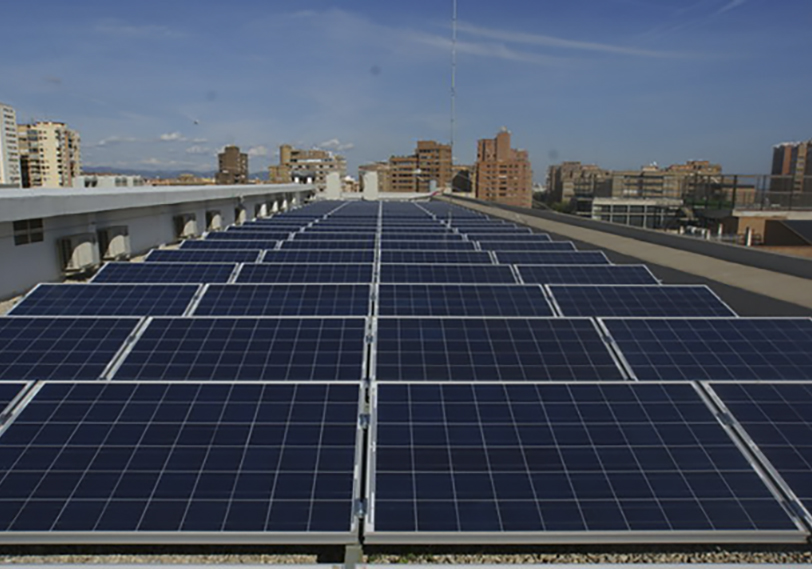Enric Marco: “Light pollution has increased with the installation of white LED lights”
- Scientific Culture and Innovation Unit
- December 22nd, 2023
Enric Marco, Senior Astronomy Technician at the Department of Astronomy and Astrophysics of the University of Valencia, works to spread the word about the problems arising from light pollution. For this reason, he is part of Salvem la Nit, a work group that studies this situation, and is president of Cel Fosc, a state NGO in defense of the night.
What is light pollution?
There are many definitions, but lately one is used that refers to light pollution as any alteration of the nocturnal environment caused by artificial light at night. Any light at night produced by humans is pollution.
What are the main emitters?
Light pollution is mainly caused by some characteristics of street lighting in cities and towns around the world, when these are badly shielded or installed, they emit more power than necessary, they illuminate outside the hours of use or they are located in places where people do not circulate. It also pollutes the light of businesses, private people and homes.
However, this pollution has been increased with the installation of LED lights – especially white ones – which are cheaper and therefore easier to install. Due to a property of our atmosphere, the blue component of these is dispersed more, and therefore the white light of LEDs will reach further and pollute more than that of warm lights.
"Due to a property of our atmosphere, the white light of LEDs will reach further and pollute more than that of warm lights"
What effects does light pollution have on the environment?
The light from the emitters is scattered in the atmosphere, but not only on a local scale, as a city pollutes its surroundings. Light reaches great distances, and at both short and long distances there are nature parks and rural areas, so the animals are no longer in a completely dark environment.
Currently, in Europe there are very few areas where the natural parks have completely dark nights like before, and this affects all kinds of animals, be they mammals, reptiles, amphibians or birds. Birds, for example, when traveling from one country to another, find city lights very attractive and stick around them.
It also affects predation, since animals are more exposed in bright areas and can be captured more easily, although the most important case is that of insects. Most insects are nocturnal, many are fliers and fly following the stars and the Moon; if you put a lamp in the middle of a natural area, the insects haven’t evolved to differentiate the Moon from a ball lamp, so they stick around to the light until they get exhausted and die.
And about people?
Our physiology, as diurnal mammals, follows a day-night pattern in which light is the main factor by which our brain knows whether it is day or night. When we see a lot of bright light during the day, and therefore also blue light, our retina sends a signal to our brain saying that it is daytime and we need to be active. The night is theoretically dark, and our brain does not receive information from the eyes because there is no blue light, so melatonin, a hormone that induces us to sleep, begins to be secreted.
Our civilisation is used to having light at night, but our brains are still the same as those of humans who lived in caves. Now we have introduced a stressor, which is the light at night, especially the very white light. Therefore, we are inhibiting the production of melatonin, which is why we do not produce the need to sleep and can stay awake until late at night.
The problem is that the lack of melatonin causes insomnia and in the long term it can also lead to mental health problems such as depression, obesity problems and, according to recent studies, even breast cancer in women and prostate cancer in men.
"Now we have introduced a stressor, which is the light at night, especially the very white light"
-----------
"Light pollution must be reduced by putting better lighting installations in the street"
What should be done to reduce light pollution?
Light pollution must be reduced by putting better lighting installations in the street, although there is also the idea of limiting businesses from having their lights on all night. However, the only solution we see is to consider light as a pollutant.
If we think about water or air pollution, there are detectors that indicate how polluted the city is, which is why if certain limits are exceeded, there are fines or bans to lower pollution levels. Now we also have light pollution detectors, so limits could be placed on the light emitted by cities.
In terms of legislation, there are no state regulations to protect us; there are regulations, but none are enforced. For example, you can’t shoot laser-type lights into the sky at night, but at parties and concerts it’s fine.
In August 2022, the decision was made to turn off the lights at night in shops and monuments. Has this decision contributed in any way to reducing light pollution in cities?
On August 2, 2022, there was a decree from the Spanish government that required lights to be turned off from 10 p.m. in unused public buildings and shop windows. However, this very innovative measure is already in the regulations, but, as I have already said, light pollution regulations are not complied with in Spain. In this way, the Royal Decree 1890/2008 already foresees that during low-use hours the lights in the streets and shop windows must be reduced.
Regarding whether we have noticed any difference, in some of the detectors we have we did notice the decrease in light at 10 o’clock at night. However, the lights in the cities are so large that no decisive change occurs, many more things would have to be turned off.
As a result of this decision, some people complained about the potential security issues that could arise. What could be done to ensure safety while ensuring the reduction of light pollution?
In France, for example, the Villes et Villages étoilés movement rewards the turning off of the lights in towns and cities from 12 at night until 5 or 6 in the morning, and there have been no safety problems. People are aware that in France at 12 at night there is no one on the street; the police have not complained and, as far as I know, crime has not increased. I’m not saying that in big cities everything should be turned off, but in small towns they could be turned off perfectly in order to recover part of the sky.
"In France, for example, the Villes et Villages étoilés movement rewards the turning off of the lights in towns and cities from 12 at night until 5 or 6 in the morning"
---------------
"You can also do things individually, such as not using your mobile phone before going to bed because it emits white light and inhibits the production of melatonin"
If a person could not control the light pollution in their environment, what could they do to alleviate the consequences on their health?
People can indeed control the lighting in their surroundings, since, for example, they can protest at the town hall. One of our initiatives is to make the population aware that you can protest if you are struck by a street light. The job of the councils is to light the streets and sidewalks, but the buildings must be dark.
Apart from this, you can also do things individually, such as not using your mobile phone before going to bed because it emits white light and inhibits the production of melatonin. Doctors recommend not using mobile phones two hours before going to bed; there’s also a night mode that everyone should put on, but it’s not enough.
If nothing is done about these types of pollution, what could happen in the future?
The main consequence is the loss of the night, that is, you would look at the sky and see no stars, you would see nothing. 80% of the European population has never seen the Milky Way, then this breaks our relationship with the cosmos; we don’t know if with a future without stars we will lose our scientific vocations.
We will also lose the ability to observe the sky with telescopes, it will be possible with the space ones, but we cannot be spending 10 billion euros continuously. However, there is something more important and dangerous. If we lose the sky, we also lose the ability to observe potentially dangerous objects approaching the Earth, which is why the threat of the arrival of asteroids will be greater because we will detect them too late because of light pollution.
Why did you decide to start a disseminating activity about light pollution?
As an astronomer, I have always been concerned about light pollution, especially not being able to observe the sky. Even so, the activist part came to me from a colleague at the university, Àngel Morales, who is president of the Coordinadora en Defensa dels Boscos del Túria, an environmental NGO. He took me to observe the Túria Natural Park and we decided to start a project to protest and spread the light pollution in the park.
Since 2011 we have had a small group called Salvem la Nit, in which we do research with detectors, but mainly dissemination. We go to natural parks and schools to talk about the problems arising from light pollution and how to reduce them. In the end, what we are trying to do is for the Valencian Courts to make a light pollution law.
"We go to natural parks and schools to talk about the problems arising from light pollution and how to reduce them"
--------
"I think that children and young people are more environmentally conscious"
You do a lot of dissemination among children, do you do it for any specific reason?
Children and young people do not have so many prejudices or fixed ideas about environmental problems. In addition, they are very active in these issues and, if you go to their class to do dissemination, they tend to ask questions, which many times the adults don’t do. I think that children and young people are more environmentally conscious.
Do you think light pollution has reached public opinion?
Now we are more aware than before, little by little we are seeing on social networks that people are protesting, but people don’t usually do it. However, it’s very easy, you just have to write an instance saying what you want and the town hall should answer you. If they don’t answer you, you can send the protest to the Ombudsman, who will answer you and tell you what you can do. From Cel Fosc we are open to advising councils on anything they need.
Categories: Recerca, innovació i transferència , Producció científica , Facultat de Física , Grups de recerca , Difusió i comunicació científica , Observatori astronòmic , Internacionalització recerca , Investigació a la UV



















